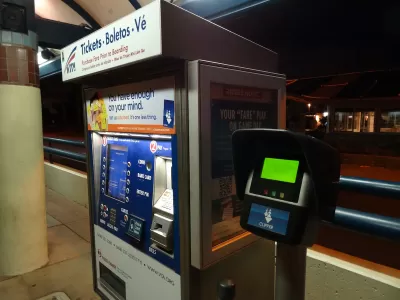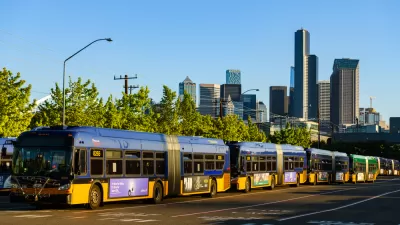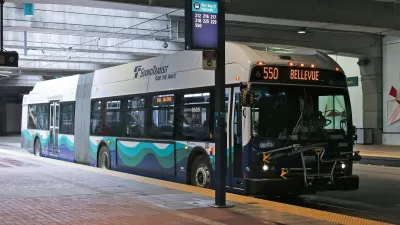A bill currently on Governor Newsom’s desk would replace punitive measures with more equitable and compassionate approaches to fare enforcement.

In an opinion piece for Streetsblog California, Haleema Bharoocha questions the policy of fining people who evade fares on public transit higher fees than people who speed in their cars.
California law punishes a failure to pay a bus or train fare with a $250 to $400 fine, a hefty amount for many of the state’s residents, as well as a misdemeanor criminal charge and potential jail time. “The juxtaposition with other types of violations within the state's legal framework is telling. Consider, for instance, traffic violations such as speeding or having an expired vehicle registration. These offenses do not carry the same severe criminal consequences as fare evasion. Instead, they typically result in the imposition of monetary fines.”
For Bharoocha, “The need for a reevaluation of this system is evident when we consider the relative levels of danger posed by infractions such as fare evasion.”
Bharoocha argues that fare enforcement disproportionately impacts minority and low-income riders, and can sometimes turn deadly during confrontations with law enforcement. Moreover, fare enforcement “diverts resources from vital safety concerns” and places a strain on local courts and administrative entities.
“In a state that prides itself on progressive ideals, we must confront the fact that these punitive measures perpetuate inequality and discrimination. These injustices are not isolated but systemic, demanding immediate attention.” Assembly Bill 819, now on the governor’s desk, offers an opportunity to decriminalize fare evasion statewide and institute more equitable, compassionate approaches.
FULL STORY: Op-Ed: Why Is Fare Evasion Punished More Severely than Speeding?

Alabama: Trump Terminates Settlements for Black Communities Harmed By Raw Sewage
Trump deemed the landmark civil rights agreement “illegal DEI and environmental justice policy.”

Study: Maui’s Plan to Convert Vacation Rentals to Long-Term Housing Could Cause Nearly $1 Billion Economic Loss
The plan would reduce visitor accommodation by 25% resulting in 1,900 jobs lost.

Planetizen Federal Action Tracker
A weekly monitor of how Trump’s orders and actions are impacting planners and planning in America.

Wind Energy on the Rise Despite Federal Policy Reversal
The Trump administration is revoking federal support for renewable energy, but demand for new projects continues unabated.

Passengers Flock to Caltrain After Electrification
The new electric trains are running faster and more reliably, leading to strong ridership growth on the Bay Area rail system.

Texas Churches Rally Behind ‘Yes in God’s Back Yard’ Legislation
Religious leaders want the state to reduce zoning regulations to streamline leasing church-owned land to housing developers.
Urban Design for Planners 1: Software Tools
This six-course series explores essential urban design concepts using open source software and equips planners with the tools they need to participate fully in the urban design process.
Planning for Universal Design
Learn the tools for implementing Universal Design in planning regulations.
Caltrans
Smith Gee Studio
Institute for Housing and Urban Development Studies (IHS)
City of Grandview
Harvard GSD Executive Education
Toledo-Lucas County Plan Commissions
Salt Lake City
NYU Wagner Graduate School of Public Service





























